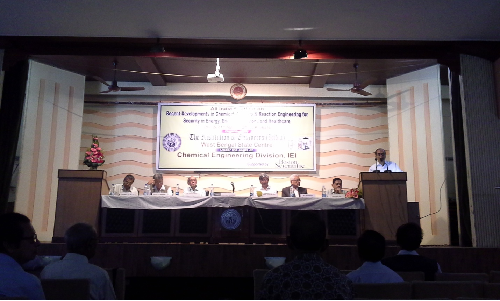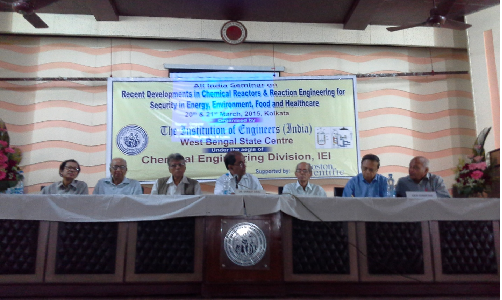
From left to right Er. Kasmirilal Mallik, Hon’ry Secretary, WBSC-IEI, Prof. NK Brahma, Co-Chairman, Chemical Engineering, WBSC, IEI, and Coordinator of AIS, Prof. S.Basu, Chairman, Chemical Engineering Div., WBSC, IEI, Prof. Ajoy Kr. Ray, Director IIEST, Prof. SM Gosh Roy, Ex Prof. of IIT-Madras, Er. Asok Kr. Das, Convener, Chemical Engineering Div, WBSC, IEI, Er. Sisir Banerjee, Chairman WBSC, IEI, delivering inaugural speech of the session. The inaugural session had also three technical talks. Er. Sisir Banerjee, as Chairman of WBSC, IEI invited the delegates and highlighted little about IEI. |

Valedictory Session; Members are present from the left to right; Er Tusar Mitra,( Member), Dr.S. Chatterjee, (Member), Prof. NK Brahma, Co-Chairman, Chemical Engineering Div, WBSC, IEI and Coordinator of AIS, Er. Sisir Banerjee, Chairman, WBSC, IEI, Prof. S.Basu, Chairman, Chemical Engineering Div.WBSC, IEI, Prof. Dr. A. Sirkar, ( Member), Dr. S.Roy, UK. |
|
Report of the All India Seminar on “Recent Development in Chemical Reactors & Reaction Engineering for Security in Energy, Environment, Food and Healthcare” on 20-21st March, 2015 under the aegis of the Chemical Engineering Division, WBSC, IEI at Sir R N Mookerjee Hall : At the outset of the Inaugural Programme, Shri Asok Kr. Das, Convener, Chemical Engineering Division invited the Chief Guest and other dignitaries to the Dias, with greetings to the Delegates. Shri Sisir Kumar Banerjee, Chairman , WBSC highlighted the activities of the WBSC, IEI and made comments on the importance of the Seminar topics. Prof. Sarajit Basu, Chairman, Chemical Engineering Division, WBSC introduced the themes and Sub-Themes of the Seminar and outlined the different Technical Session – I to Technical Sessions – IV, organised on 20th and 21st March, 2015. Prof. N K Bramha introduced the Chief Guest, Prof. Ajoy K Ray, the Director, Indian Institute of Engineering, Science & Technology (IIEST). Before joining BESU & IIEST, Shibpur, Prof. Ray was involved as Head of the SMST (School of Medical Science & Technology), IIT – Kharagpur. Prof. Ray, in his address as the Chief Guest and Keynote speaker, stated the importance of the Theme in the context of energy security & Healthcare. He emphasized the importance of Reactor and Reaction Engg, including the multi-purpose activities of Human organs as individual and separate Reactors, participating either in separation or in immune responses and metabolic activities. Prof. M K Ghosh Roy an eminent Academician (formerly Professor, IIT Chennai), as the Guest-of-Honour highlighted different types of Reactors for security of Energy, Environment, Food and Healthcare. Shri Kashmir Lal Mallik, Honorary Secretary, WBSC proposed a hearty Vote of Thanks. After the inaugural programme, Technical Session – I was held with three eminent speakers. Prof. Amalesh Sirkar, an Academician and well known Industrial expert, introduced a concept in Gas-solid eatalytic reaction (for conversion of Coal to liquid fuel, known as clean coal Technology) with improved performance at reduced cost, along with reduction of catalyst requirement to the extent of 40%. Dr. U K Saha presented an impressive lecture on Heart management, stated Human heart as a Bioreactor. He highlighted preventive measure on coronary arterial diseases. Dr. Smarajit Roy, CMD, City-Waste Bioenergy Co. of UK, introduced innovative membrane Technology for mitigation of CO2 emission and Energy production. Technical Session – II was started at 10.30 a.m. on 21st March 2015 with the sub-theme on Bioreactors and Bioprocesses. Session Chairman Prof. S Basu deliberated on product specific reactor for handling different products namely (a) Oscilating flow Reactor for multi-step transesterification process (for Biodiesel production from veg.Oil, b) Air-lift fermenter for mixing of reactants (without mechanical agitation) for protection of fragile, shear sensitive bio-products, e) Membrane contact absorption reactor (STHE configuration) with NH4 OH Prof. Amit Chakraborty an eminent expert in Genetic Engineering and in Biomedical Engineering, Director, IGE of WBUT, remarked Human Organs, as reactors. Prof. Chakraborty informed the development of Bionic man which can be used for fundamental studies and future treatment of organ failure. Prof. N K Bramha, as the third speaker, talked about the evolving nature of Bioreactor design that needs molecular, scientific, engineering & technological involvements. Finally he emphasized the importance and design conditions of Photo-Bioreactor, for mitigation of CO2 emission. At the III Technical Session, Prof. Sudip K Das (CU) talked about the hydrodynamics of tapered bubble column reactor using non-Newtonian fluids , for desigining the Bio-reactor. Dr. Ranajit Chowdhury, as the second speaker (Technical Session- III) highlighted UV driven Bio-reactor for detoxification of hazardour waste water. Shri Amar Nath Bhadra talked about Green Energy towards sustainability. Dr. Sivabrota Chatterjee as the Session Chairman concluded his remark about the speakers. Technical Session IV was chaired by Shri Sisir Kumar Banerjee, Chairman, WBSC and co-ordinated by Prof. N K Bramha, as the student session Co-ordinator(PG and Research Scholars). Seven papers were submitted, and salient features of the papers summarized as follows : a) Decontamination of bacteria in drinking water by UF reactor ( Arunima De et al) h) Validation of drug through molecular Docking and Bioinformatics (Anamika Roy et al) After the Technical Session IV (devoted to PG students and RS), the Co-ordinator of the Session, Prof. N. K. Bramha, organised distribution of Certificates to 25 students for active-participation and paper presentation, presented by Shri Sisir Kumar Banerjee, Chairman, WBSC, Prof. S Basu and Prof.Amalesh Sirkar. Following Technical Session –IV, Valedictory programme was organised with a Panel discussions (Panelists : Shri Sisir Kumar Banerjee as Chairman , Prof. S Basu, Prof. Amalesh Sirkar, Dr. S Roy, CMD of City Waste Bioenergy of UK, Shri Tushar K Mitra, CMD of Kamitter Filtration Co., Kolkata, Dr. S. Chatterjee and Prof. N K Bramha). Based on comments /suggestions made by the Panel Members, along with feedback from the Delegates, Fellow-up Action Plan was made with the recommendations as follows: 1) Participation of students as IEI students Members at the AIS on relevant topics like Energy security, environmental pollution management and Healthcare Engineering should be encouraged. |
|
